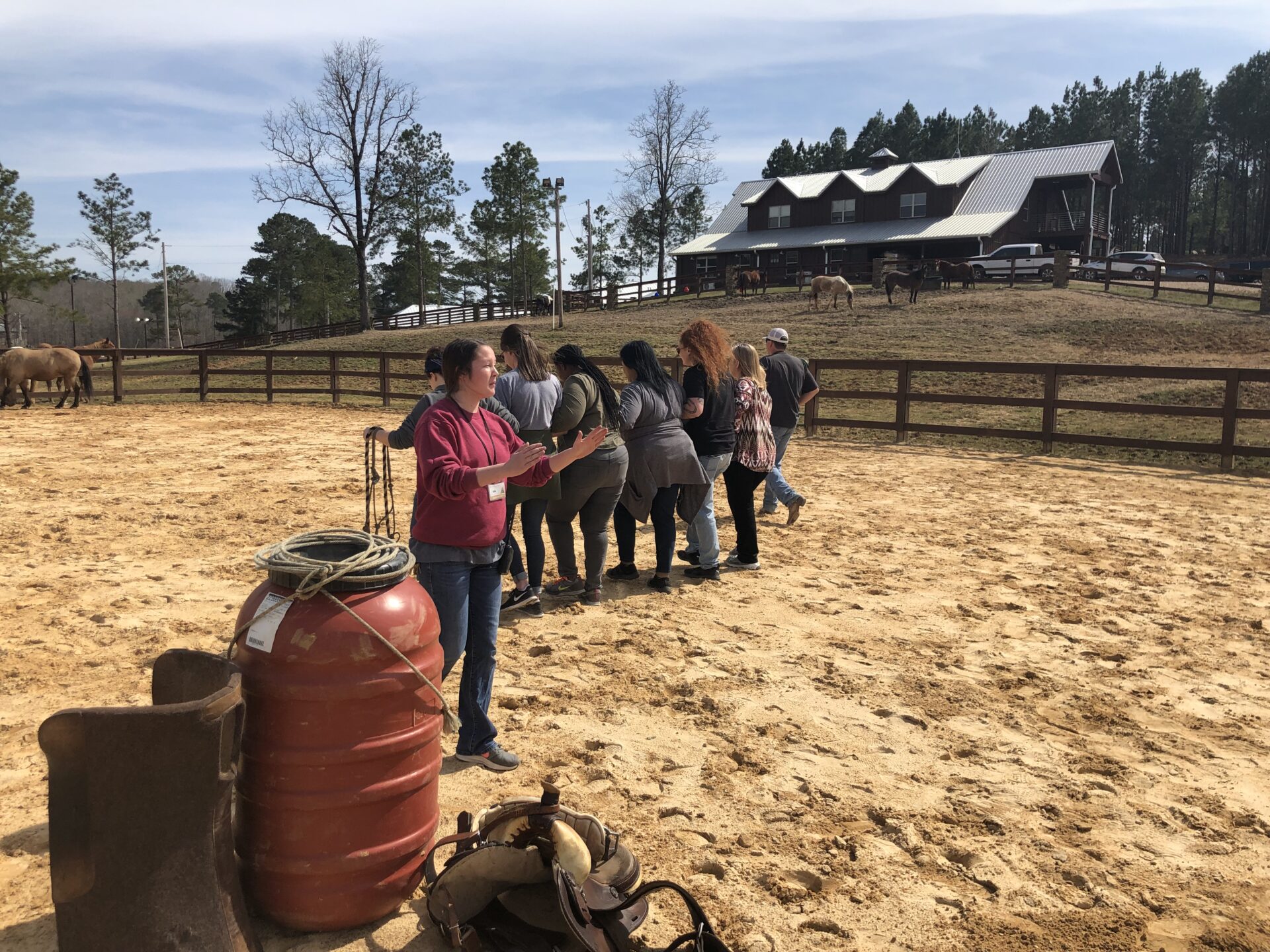Extras News
Oxford Treatment Center Therapist Uses Horses as a Means of Mitigating Addictions
By Emily DeWitt
Hottytoddy.com intern
esdewitt@go.olemiss.edu
Katherine Cagle-Holtcamp is constantly working to improve the misconceptions of equine therapy. As a certified equine therapist, her work at the Oxford Treatment Center is improving the lives of those who have addictions they cannot fix alone.
According to its website, the center’s mission is to provide quality, comprehensive, compassionate, and innovative care to adults struggling with substance addiction and co-occurring mental health disorders. Equine therapy is a central part of that, Cagle-Holtcamp said.

Cagle-Holtcamp learning about therapeutic vaulting with at-risk youth. Photo provided.
In its essence, equine therapy is the incorporation of horses into a form of treatment for patients who have addictions. It is broken up into four steps: a cognitive equine science exam, emotional safety assessment, physical assessment of confidence, and vital signs of horses.
The cognitive exam is to get a feel for what the patient knows about horses coming into the program. The emotional safety assessment is used to understand the mental state of each patient before starting the program, as well as when they leave. The physical assessment is to gauge the comfort level of the patients in an equine environment.
“I provide equine-assisted learning sessions primarily using hands-on demonstrations and activities. I conduct equine-assisted psychotherapy sessions by request of primary therapists and I facilitate family day programs and experiential retreat sessions for professionals in the industry,” Cagle-Holtcamp said.
She said comprehensive therapy is not simply petting and riding horses.
“We have six weeks to positively impact their recovery to a point of hopefully ending substance use. If we spent any of that time only petting a horse or riding around in circles, we are doing a grave disservice to the lives of our clients,” Cagle-Holtcamp said.
Patient activities vary from physically to emotionally-driven exercises.
“Equine-assisted activities include therapeutic riding, mounted and grounded activities, grooming, and barn practices that any client, student, volunteer, instructor, and horses are a part of,” Cagle-Holtcamp said.

Cagle-Holtcamp working with therapeutic riding participants at summer camp. Photo provided.
She also offers a form of this treatment, called therapeutic riding, to those who have special needs. Individuals are seated on a horse, whose walk is similar to humans, to help build core strength in a safe way, she said.
Her Journey
Cagle-Holtcamp didn’t always know she was passionate about equine therapy. Learning more about the program helped her learn more about the process.
“I had zero idea what I wanted to do with my life when I registered for college. About a month before I moved to college, I was given an opportunity to volunteer with a therapeutic riding program for the special needs week at the summer camp where I had camped for 10 years,” Cagle-Holtcamp said.
She completed a bachelor’s degree in animal and dairy science with a concentration in equine science and agricultural economics, and went on to get a master’s degree in human development and family science. She was a graduate research assistant with a therapeutic riding program and worked on a literature review for a seminar class. During the research process, she came across equine therapy with veterans.
“I’ve had the opportunity to work with individuals with special needs, at-risk youth, families, veterans, and individuals in recovery in just the past four years alone. I may not have consciously decided this was my path from the beginning, but I know this is where I am meant to be,” she said.
One of Cagle-Holtcamp’s patients said equine therapy greatly impacted his recovery.
“Honestly, OTC having a diverse amount of programming is what got me interested in recovery,” a man by the name of Mr. Fritz said. “Being able to have interaction with horses—which I had not done in many years—was invigorating and brought me joy that I hadn’t experienced in so long. I grew up raising show horses and riding the trail. This was a very ‘remember where you come from’ kind of moment for me.”

“This work will change the lives of individuals who deserve help simply because they are human. This is the least I can do to contribute to proper services being available. At the end of the day, people matter,” Cagle-Holtcamp said. Photo provided.
Tori Ossenheimer, Cagle-Holtcamp’s supervisor, said she’s proud of how the equine therapy program has grown. Equine-specific therapy is now offered six days out of the week at OTC.
“Thanks to Katie’s assistance we have also begun conducting equine-specific research on-site, which I never could have dreamt would happen early on. We have come a long way with our programming and services we are able to provide with the hard work and creativity of our staff,” Ossenheimer said.
Cagle-Holtcamp’s work is important to her, she said, and she continues to dedicate her time to improving the lives of people who need her help.
“This work will change the lives of individuals who deserve help simply because they are human. This is the least I can do to contribute to proper services being available. At the end of the day, people matter,” Cagle-Holtcamp said.





























